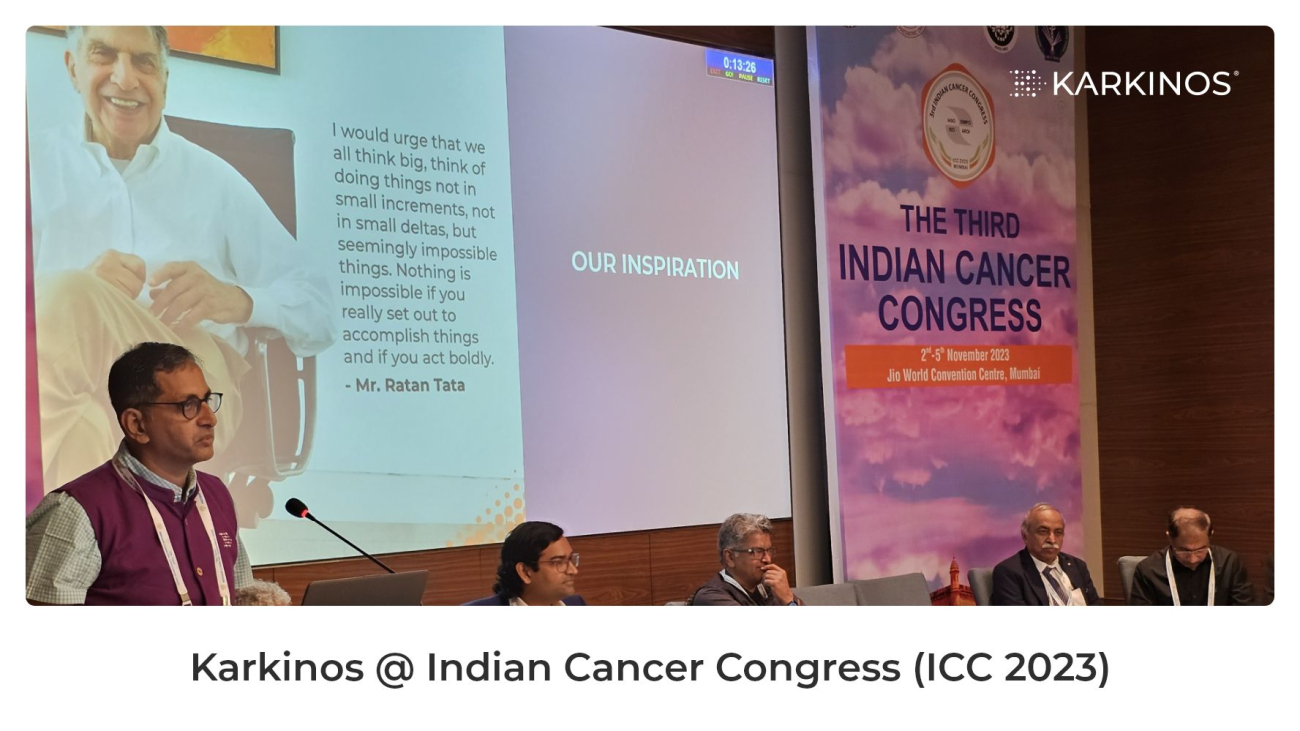Indian Cancer Congress 2023: Propels a shared vision for enhanced cancer care
Indian Cancer Congress 2023 is a collaboration between the four largest professional oncology societies of India, which together represent the majority of practicing surgical, radiation, and medical oncologists of India, as well as other specialists like onco-pathologists, onco-radiologists, etc.
The four societies are the Indian Association of Surgical Oncology (IASO), The Indian Society of Oncology (ISO), The Indian Society of Medical and Paediatric Oncology (ISMPO), and The Association of Radiation Oncologists of India (AROI).
ICC is jointly conducted once every 4 years by the four organizations in lieu of their annual conferences. The first and second editions of the ICC were conducted in Delhi in 2013 and Bengaluru in 2017, respectively.
The 3rd thematic edition of ICC was organised at the Jio World Convention Centre, Mumbai between November 2nd and 5th, 2023, The theme “Continuum of Care in Cancer” was decided to bring forth all aspects of developments in cancer through this congress.

Among several notable features of the congress, the third edition of Indian Cancer Congress 2023 brought together global medical professionals, oncologists, scientists, allied specialists, ancillary service providers, advocacy groups, and policy makers involved in cancer care in India. Approximately 6,000 oncology professionals from India, neighbouring countries, Middle East, Southeast Asia, Europe, Africa, and North America convened at this year’s ICC.
Karkinos Healthcare is on a mission to take affordable cancer care closer to the people. The company is propagating early cancer detection and screening of common cancers across India. At this marquee congress, Karkinos Healthcare established substantial participation by presenting key findings in the form of posters and papers, engagement in panel discussions, delivering knowledge-enhancing workshops, and exhibiting their novel services.
This blog presents views and opinions on the participation by a few of Karkinos Healthcare’s employees.
Comprehensive Road Map
In the quest for effective cancer treatment, a Comprehensive Road Map was unveiled, spanning urban and rural areas alike. This strategic plan laid emphasis on timely and efficient action, guided by the Uno Road book published by the Sunset Commission.
The 3rd Indian Cancer Congress advocated for this roadmap’s implementation. The roadmap’s success hinges on widespread propagation and addressing the shortage of surgeons in the country, emphasizing the need for concerted efforts to make cancer treatment accessible and effective for all.
KEY TAKEAWAYS FROM ICC 2023
Knowledge sharing at its pinnacle
By Dr. Anjali Kulkarni, Vice President – Clinical Informatics, Karkinos Healthcare
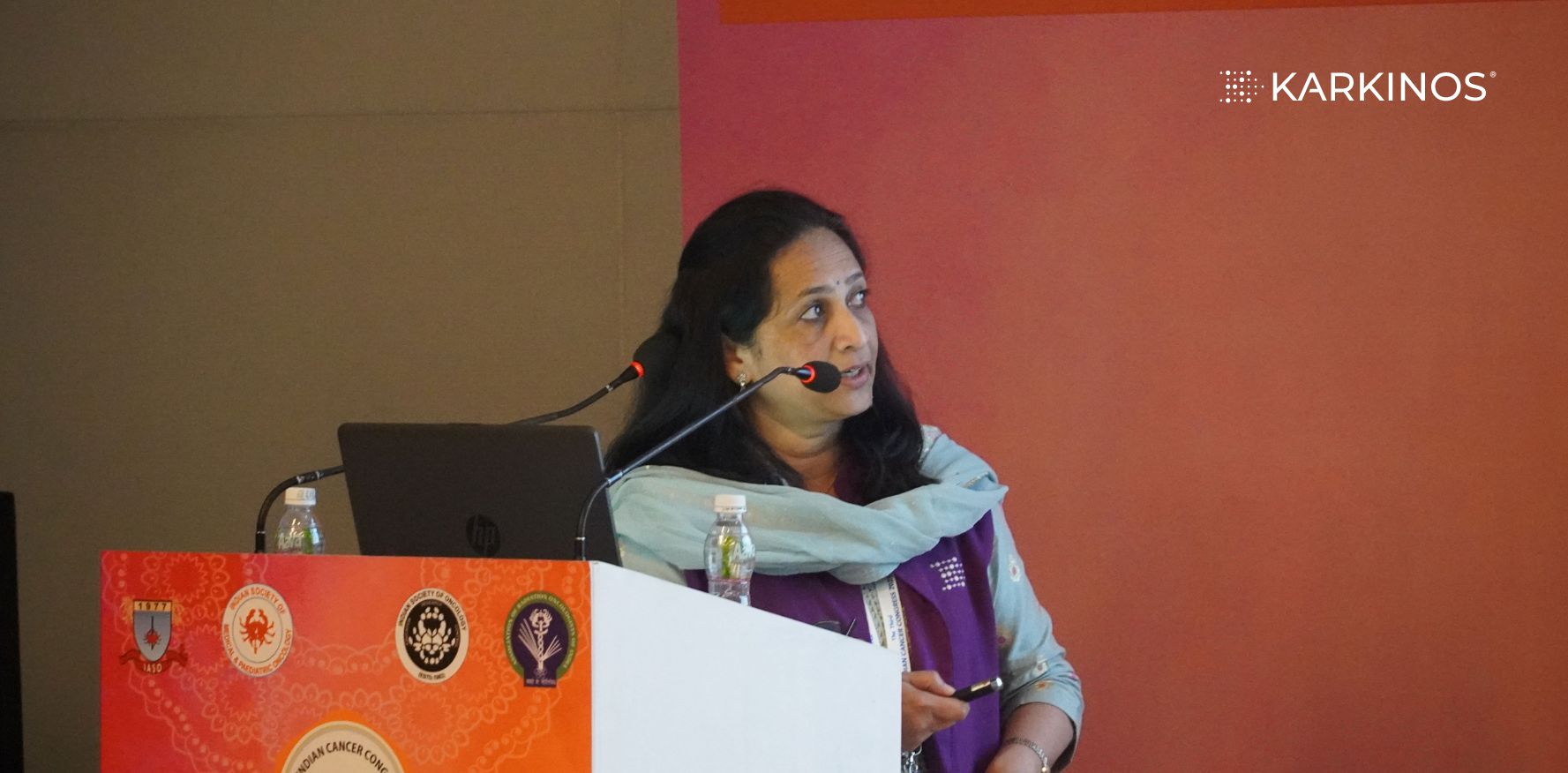
The recently concluded ICC 2023 offered a huge opportunity for learning new frontiers in cancer care. Clinicians presented their experiences in patient care, breakthrough outcomes of their practices or the new protocols they tested. The systematic presentations either as a concise talk or as a keynote speech was a great way of sharing knowledge.
This cancer congress was an amalgamation of all specialties like surgery, medical, and radiation oncology. There were many cross-modality sessions, which were very insightful. ICC included sessions from specialties like radiology, pathology, and anaesthesia, which are equally important in an end-to-end patient care. All the sessions had an impactful delivery and emphasized the beginning of an era of precision medicine in cancer care.
Indian and international faculties presented their clinical studies, which gave us a global perspective. There were 14 halls, which were simultaneously hosting speakers and over 2000 sessions were delivered. The knowledge sharing was at its pinnacle!!
ICC has always been a great opportunity for students and young clinicians to present their research work in oral or poster format. This congress had around 1300 posters ranging from topics like cancer screening, early detection, palliative care, patient advocacy psycho-oncology, and many more. The posters were evaluated, and prizes were given based on relevant concepts. This proved to be very encouraging for young minds to study deeper into their research areas.
One of the other interesting sessions was Live Surgery Video presentations, showcasing challenging surgical procedures. This was an innovative way of learning for many young surgical specialists.
ICC encouraged talks from all allied clinical areas like care delivery, ways to reduce cancer care gaps and skill management. Sessions on the Odisha model of care delivery were very insightful. There was an interesting session on health insurance and its impact on cancer care in our country. It was exciting to see clinicians debating with health insurance experts. Such engaging discussions will make a great headway for the policy makers and administrators.
Oratory lectures from the stalwarts in oncology were goldmine. It was so inspiring to listen to their journey and the evolution of cancer care through them. The symposiums, workshops, and panel discussions across specialities added multidisciplinary flavour to the event. Trade exhibition is one of the highlights of ICC. All the business-like pharma, medical device, and bioresearch companies associated with oncology had put their stalls and devices on display.
National Health Authority (NHA) also had the representation of governments efforts for inclusive health and health insurance coverage for the citizens. American Society of Clinical Oncology (ASCO) had their kiosk explaining the membership benefits of joining the world’s leading professional organization for physicians and oncology professionals. These truly are gateways for continuous learning.
ICC like events offer unique opportunities for networking, making new friends, and going back more enriched to our clinical practices.
Highlighting molecular derangements in precision oncology
By Dr. Prasanth Ariyannur, Consultant and Head, Clinical Genomics Laboratory, Karkinos Healthcare, Kochi
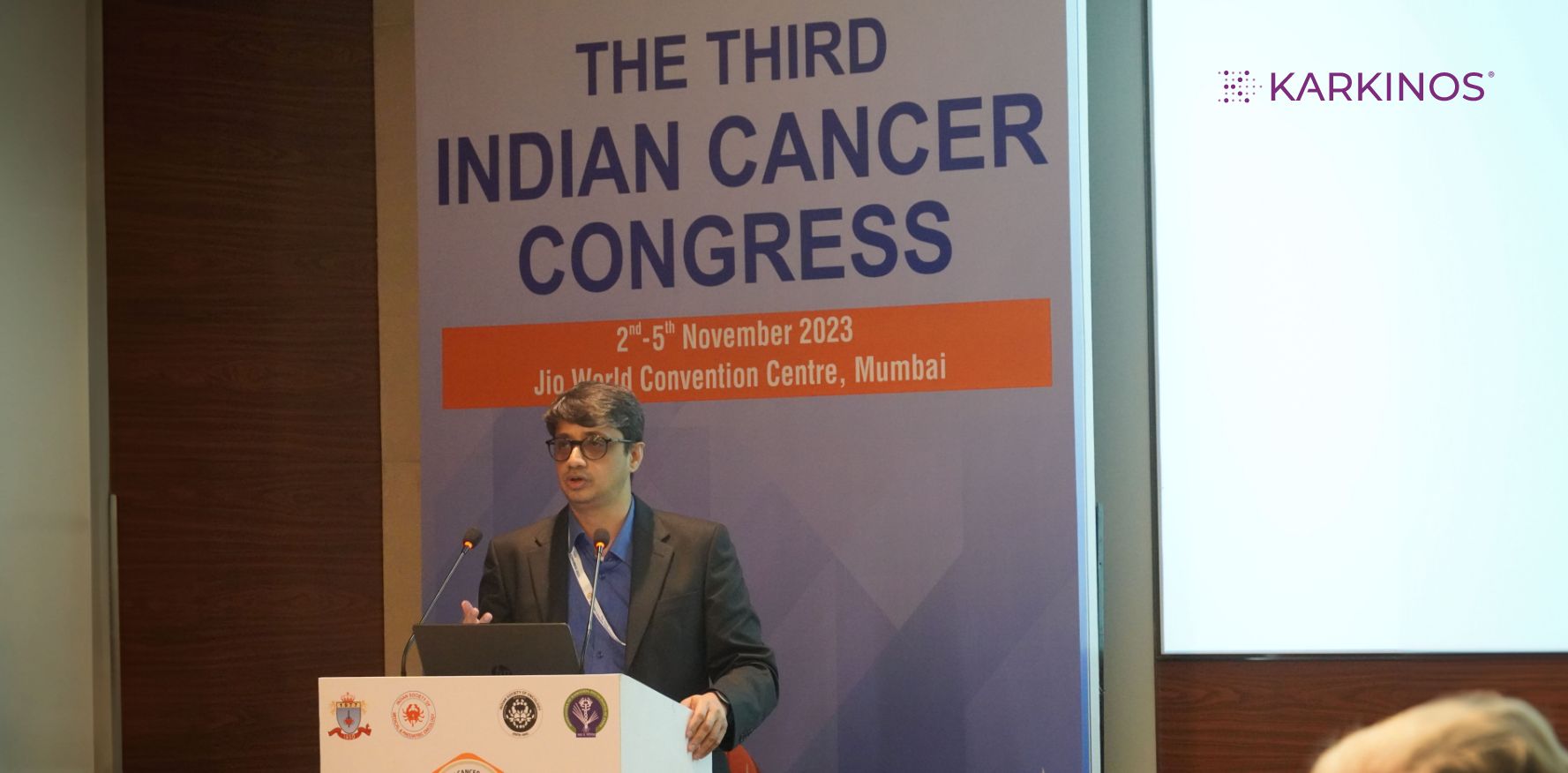
Being a basic biochemist and molecular biologist for the past two decades or so, my connection to cancer is solely related to the cellular and molecular biological aspects of cancer in general. The molecular biology of cancer and its clinical application is mostly now focused on the identification of genetic and genomic derangements assisting detection and diagnosis, predicting prognosis, and selecting effective targeted therapy.
The field has now been very focused and developed as precision oncology to identify the unique cancer variety and treatments can be customised based on the uniqueness of cancer in every patient. In that aspect, in my perspective, ICC 2023 has given particular importance to the molecular biology of cancer.
On this topic, a satellite programme was conducted jointly by the Indian Society of Medical and Paediatric Oncology (ISMPO) and the European Society of Medical Oncology (ESMO) at ICC 2023.
The programme proved successful in sharing the current knowledge of molecular derangements in Precision Oncology. The programme coordinators arranged courses and case discussions systematically to help the audience understand the molecular diagnostic tests and the identification of genomic markers in cancers and their relevance in diagnosis, prognosis, and treatment.
I had the opportunity to present the online database, which is used for variant curation and reporting. The audience was very informed and gave excellent feedback and queried to make it a very interactive session.
In my opinion, this programme highlighted that molecular pathology is rapidly evolving adding up a lot of information in cancer diagnostics and management. Because of the rapidity and volume of resources, there is resistance to including the usage of molecular markers for clinical decisions and management.
Once the flux settles, it can be reduced and more usage of molecular testing and markers can occur in the coming years. This is very evident in the discussions. The clinicians were mainly split in half in terms of the usage of molecular markers. On one side, some clinicians want to conduct molecular testing in all cancers irrespective of the type or stage or other features of cancer, age, or other demographics of the patient.
They want to include all targetable drugs available in the research community to be included in the report. On the other side, there are clinicians who think that the entire molecular diagnostic test is not at all required, except for those cancers with FDA-approved drugs available. In one of the last sessions at the congress, one of the senior oncologists, indicated to the panel members that “Comprehensive genomic profiling -CGP- is not the way to go for any cancer type”.
On the second day, there were multiple sessions on the pre-analytical, analytical, and application of molecular tests such as fluorescent in situ hybridization and other cytogenetic techniques, real-time PCR-based tests, sequencing-based tests, and liquid biopsy and circulating tumour cell along with chemosensitivity assays tests.
These sessions were very interactive and informative for both the panellists and the audience. The utility of comprehensive genomic profiling was very much expounded in multiple sessions of case discussions during the meeting. The adoption of many molecular markers in routine clinical practice is solely dependent upon the guidelines prescribed by the NCCN (National Cancer Care Network) and other international professional bodies (ASCO, ESMO, CAP, AMP). The application of these guidelines in Indian scenarios and practice requires more deliberation.
On the final day, I presented our data on CGP testing in an Indian scenario. There were two sessions back-to-back on the test validation of CGP and then on the clinical utility of CGP. The validation data was the first-ever study conducted in India. The CGP was based on the Illumina platform. Overall, among 150 cases included in the study, there were about 30% of cases that underwent CGP had an FDA-approved drug available.
About 80% of cases had some targetable agent available in active clinical trials. This data was not seen by the senior oncologists during the meeting, so it was not discussed in the meeting. However, this shows the importance of CGP in cancer management. When I presented the data, it was obvious that the panellists and the audience had limited basic concepts to question the specific details explained. This shows that more studies like this is required to be done across the country to help oncologists as well as other medical professionals understand the utility and capabilities of molecular testing in cancers.
As I informed through my presentation, every cancer clinician is a cancer researcher too, if they can pay attention to the molecular changes in the cancer. Understanding the molecular changes, especially during the longitudinal course of the cancer, could not only help in diagnosis and treatment but also to understand cancer biology in general in our own population in India. This is centrally needed to develop newer molecular targets and modalities of treatment. I hope that in the coming ICCs, more studies and results of molecular testing will be incorporated so that our cancer knowledge will be enriched which would help develop new treatments for early detection, as well as cure.
ICC-2023: Confluence at the beach
By Dr Jyoti Bajpai Dikshit, Genetic Counsellor, Diagnosis-BD & Marketing
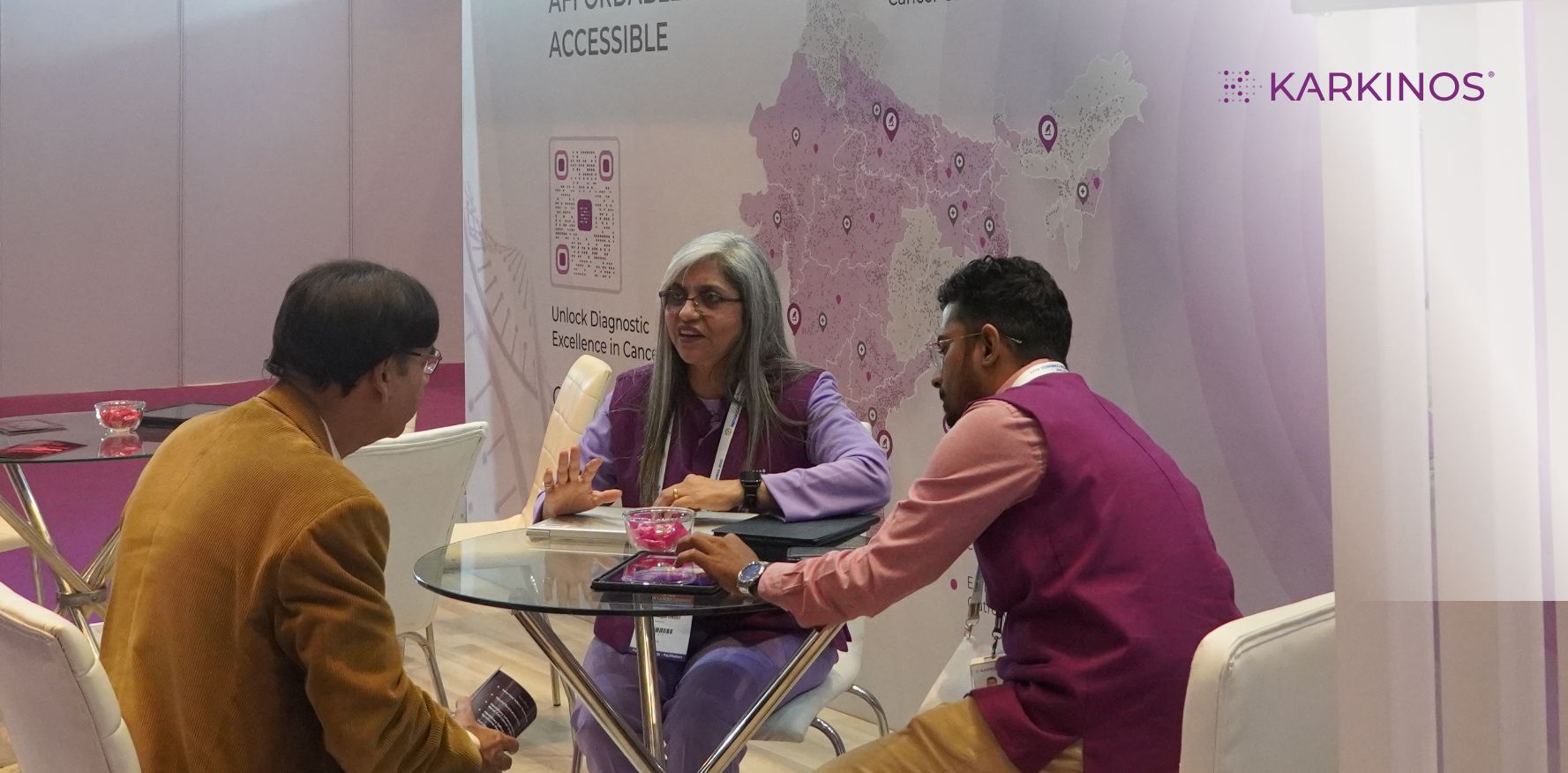
The Indian Cancer Congress (ICC) is the Kumbh Mela of Oncologists in India, occurring every four years. It is the confluence of three streams – Surgical Oncology, Medical Oncology, and Radiation Oncology creating an ocean of knowledge, training, and networking. This year, this Triveni, named as ICC-2023, happened on the beaches of The Arabian Sea, in the City of Dreams, at the Jio World Centre, Mumbai.
I had attended the first ICC at Delhi as a representative of one of my previous organizations. The enormity of the conference had created a desire in me to be part of every ICC, as part of the organizing team. And, that dream came true in ICC-2023 by being a part of the team: “People in Purple from Karkinos – Volunteers for Anyone, Anywhere, Anytime”.
It was an immense experience starting from the zeroth milestone of planning the conference to the final milestone of wrapping up on the last day of the conference.
The chief duties assigned to me were –
- To welcome the International Oncology Guests at Mumbai airport and escort them to their respective hotels as a Karkinos Scientific Host.
- To invite the oncologists to participate in Karkinos Marketing Survey on Next Generation Sequencing at the ICC Karkinos Stall.
My ICC marathon cum relay race started a couple of nights before at Mumbai airport along with my colleague Vanchinathan Moopanar, Administrative Assistant, Mumbai, Karkinos Healthcare. Those nights and days spent standing at the airport will always be in memories. It was a great Google exercise to search the pictures of the international faculty after reading the names in the list given to us. And, then start to looking for those faces in the travellers’ crowd. We could find all of them except for a couple of guests, who did not match our criteria of search. But we succeeded every time no matter how difficult it was.
Karkinos Marketing Team had created an interesting questionnaire to conduct a marketing survey on Comprehensive Genomic Profiling for Oncology using Next Generation Sequencing. The strategy was to attract the conference attendees to Karkinos stall for attempting the survey and win a lucky draw for attempting the survey.
I got the privilege to do the “marketing”. With an extempore educational speech on Next Generation Sequencing (NGS) and its utility for Personalised Targeted Therapy for Cancer Treatment and Predisposition of Hereditary Cancers through a microphone and a loudspeaker, I along with other volunteers were successful in getting the survey forms filled by many oncologists. The analysis of this survey can give good insights on the awareness of NGS, apprehensions about NGS, and acceptance of NGS among oncologists.
This exercise of getting the opinion of oncologists on an important topic like NGS for Oncology through an effective survey and a tempting lucky draw made our stall noticeable. We got the opportunity to have engaging conversations with the conference attendees.
Explaining the backdrop of Karkinos’ stall – the concept of 4Ds (Detection, Diagnosis, Delivery, and Discovery), the vision of Karkinos with a goal to reach masses, the mission of Karkinos to make Oncology services available, accessible, and affordable for all the cancer patients by breaking all the barriers was an overwhelming experience. This was an opportunity to network with oncologists at national level.
If I sum up my experiences, the visibility and acceptance that we have gained by following the culture of “Atithi Devo Bhav” as volunteers, popularly known as “People in Purple” in four days of ICC-2023, will remain with Karkinos forever. Also, the venture that we have started at ICC-2023, is not over. In fact, it has created a path for us to walk on it and reach the destination of democratizing the cancer care service for all.
Cancer care in India has come of age
Dr. Jyotirup Goswami, Clinical Oncologist, DCCN-Medical Affairs
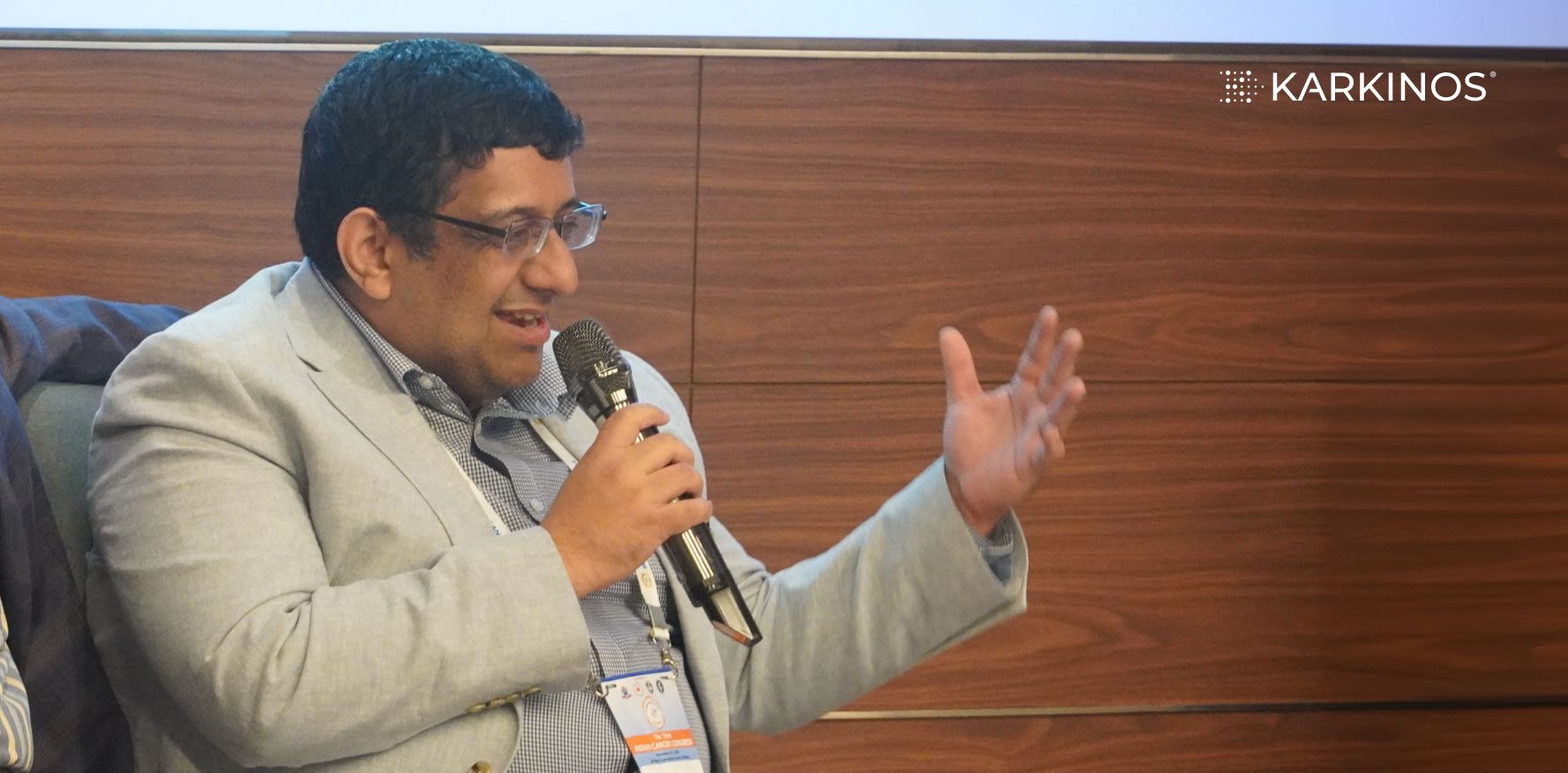
After a long delay due to Covid 19, the Indian Cancer Congress at Mumbai finally could be held between 2nd and 5th November, 2023.
The joint conference of the 4 Indian cancer societies (ISO, ICS, ISMPO, and AROI), showcased the best & most cutting-edge research and academics coming out of India and the world.
In the spectacular setting of the Jio Convention Centre, it could safely be said that cancer care in India has come of age, now able to engage with the world on the state of the art of Oncology.
It was clear that technology, and how we harness it, will play a crucial role in solving our cancer problems, be it in developing more & more sophisticated equipment for treatment, diagnostics for precision oncology or information technology to bridge the gaps in cancer screening and even therapeutics.
At the same time, service delivery remains a challenge in a country which is resource-rich, but unequal and there were some fascinating sessions on this aspect as well. It was a matter of pride and excitement that the Karkinos model of distributed cancer care treatment, backed by seamless integration of information technology and molecular diagnostics created a big impression on delegates and faculty.
As Vice President of AROI, I had an extremely hectic conference, chairing the Young Radiation Oncologists Session as well as being a Judge for various proffered presentations (both poster and oral), besides the various official meetings. I had the privilege of being a Speaker in a Debate on whether we should or should not escalate radiotherapy doses in those oropharyngeal cancers, which are not associated with the Human Papilloma Virus (HPV) infection.
Of late, the HPV-associated oropharyngeal cancers have been classified as a separate good-prognosis group and candidates for treatment de-intensification. On the other hand, HPV-negative oropharyngeal cancers, which are more common in India, have a less favourable outcome and developing the optimal strategies or combination of strategies for these cases is still a work in progress.
Growing need for digitally led risk-stratified cancer screening methods
By Kausar Kidwai, AVP – Women Wellness
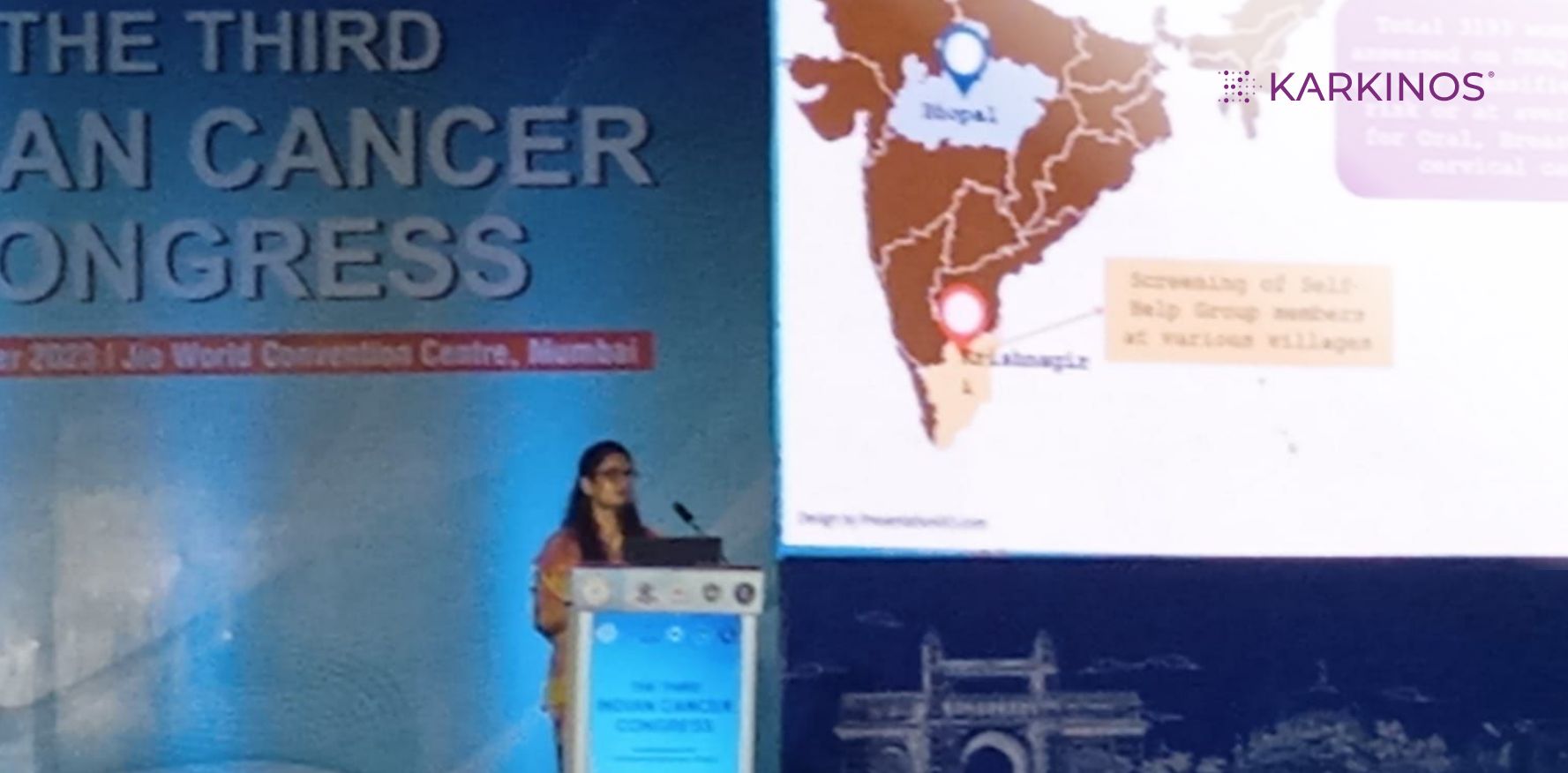
India’s answer to extending quality healthcare with its barrage of challenges with regard to clinicians and significant population lies in leveraging digital solutions. As per NFHS-5, only 1-2% citizens of the country have ever undergone a screening for oral, breast and cervical cancer.
Given the government focus to screen India’s population between 30-65 years once every 5 years, age-stratified universal population-based cancer screening programmes have been on-going since 2016. With the growing recognition of the potential harms, costs and systemic challenges from universal age-related population-based cancer screening programs, risk-stratified screening leveraging digital solutions has been proposed to reduce costs and harms.
I was honoured to present an abstract on “Clinical effectiveness of risk-stratified screening based on digital risk assessment questionnaire in Indian women: a cross-sectional study” at the Indian Cancer Congress 2023, Jio Convention Centre, Mumbai.
With India going digital full scale under ABDM 2021 onwards, the Karkinos App is integrated with ABDM, generates ABHA IDs and is able to link health records. A digital solution which is able to risk stratify and also act as an awareness tool may be India’s answer to PBS, taking the load off healthcare systems and FLWs, as envisioned.
Our findings are consistent with reportedly lower cancer detection rates and lower mortality of risk stratified screening compared to age stratified universal screening. Risk stratified screening may further be improved by integrating biologic characteristics such as breast density or germ line mutations.
